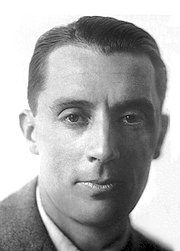Frédéric Joliot-Curie
| Frédéric Joliot-Curie | |
|---|---|
 |
|
| Born | Jean Frédéric Joliot 19 March 1900 Paris, France |
| Died | 14 August 1958 (aged 58) Paris, France |
| Nationality | France |
| Fields | Physics |
| Alma mater | University of Paris |
| Known for | Atomic nuclei |
| Notable awards |
|
| Spouse | Irène Joliot-Curie |
Jean Frédéric Joliot-Curie (French: [fʁe.de.ʁik ʒɔ.ljo ky.ʁi]; 19 March 1900 – 14 August 1958), born Jean Frédéric Joliot, was a French physicist, husband of Irène Joliot-Curie and Nobel laureate.
Born in Paris, France, he was a graduate of the École Supérieure de Physique et de Chimie Industrielles de la Ville de Paris. In 1925 he became an assistant to Marie Curie, at the Radium Institute. He fell in love with her daughter Irène Curie, and soon after their marriage in 1926 they both changed their surnames to Joliot-Curie. At the insistence of Marie, Joliot-Curie obtained a second baccalauréat, a bachelor's degree, and a doctorate in science, doing his thesis on the electrochemistry of radio-elements.
While a lecturer at the Paris Faculty of Science, he collaborated with his wife on research on the structure of the atom, in particular on the projection, or recoil, of nuclei that had been struck by other particles, which was an essential step in the discovery of the neutron by Chadwick in 1932. In 1935 they were awarded the Nobel Prize in Chemistry for their discovery of "artificial radioactivity," resulting from the creation of short-lived radioisotopes from the bombardment of stable nuclides such as boron, magnesium, and aluminum with alpha particles.
In 1937 he left the Radium Institute to become a professor at the Collège de France working on chain reactions and the requirements for the successful construction of a nuclear reactor that uses controlled nuclear fission to generate energy through the use of uranium and heavy water. Joliot-Curie was one of the scientists mentioned in Albert Einstein's letter to President Roosevelt as one of the leading scientists on the course to chain reactions. The Second World War, however, largely stalled Joliot's research, as did his subsequent post-war administrative duties.
...
Wikipedia
